Self-Help Groups, which join each Speed School student’s parent or guardian in income generation activities, are an essential component of the Speed School approach. Over the past few years, by promoting greater ownership and shared investment among members, the Self-Help Group (SHG) strategy has evolved towards greater impact and sustainability.
Geneva Global’s Speed School Program supports out-of-school children to rejoin the education system through an accelerated year of learning which covers the first three years of primary school curriculum in just ten months. However, some of the biggest obstacles to education attainment for students begin before they even reach the classroom. Chief among these is poverty. While primary schooling in Uganda has been free for the past two decades, extraneous costs such as uniforms, learning supplies, and PTA fees do fall to parents. These can add up quickly and inhibit parents’ ability to put their children through school. While Speed School students do not pay any such fees, their enrollment still presents an opportunity cost to parents as they lose their child’s assistance with household chores, childcare, tending animals, and, in some cases, contributions to the family income.
Understanding this barrier to education, the Speed School program requires that one parent or guardian of each student join a Self-Help Group. Self-Help Groups, composed of the 30 parents/guardians of each Speed School class, are an essential accompaniment to the Speed School classroom. Through the provision of training and support in functional and financial literacy, in group savings and micro-lending strategies, and in income generation activities (IGAs), SHG members build the knowledge, skills, and confidence necessary for mothers (or other guardians) to strengthen their financial security and support continually their children’s education.
Since the 2016 introduction of Speed School in Uganda, Geneva Global has provided each SHG a small initial capital injection from which members are able to borrow to take on income generation activities. These activities, such as farming, animal husbandry, and fish mongering, allow members to repay their loan with an interest rate agreed upon by the group and to generate personal savings on a regular basis. With time, SHG members grow the total pool of loanable funds, invest more into their own IGAs, and turn greater profits and savings. As a result, they can better provide for the health, education, and general wellbeing of their children, including both those enrolled in Speed School and those who are not. According to Caroline Adokorach, Community Engagement Manager at Geneva Global Uganda, “The goal of the Self-Help Group is to enable the learning environment at home, in the community, and at school to ensure the continued participation and success in schooling for former out-of-school children.”
In recent years, the SHG strategy has evolved to better reach this goal. While the many versions of the group have yielded affirming successes, they have also illuminated opportunities for improvement and growth. One such opportunity centers around the risk management of individual IGAs. James Nyeko, a Speed School Coordinator with Hope and Peace for Humanity, an implementing partner of Geneva Global Uganda, explains that sometimes members do not consider financial risks in choosing their IGAs. He notes that some, for example, are “choosing farming when the rain season is coming to an end.” Another example comes from one SHG member, Boniface Ejuka from the Akwyani village. In the past, Ejuka would buy chickens from people’s homes in the village and sell them for a profit in the local market three days a week. He explains, however, that he “incurred losses because of unhealthy chickens that could not be detected at the time of buying and [then] die.” Thus, SHG members are not always able to predict or account for the risks of their IGAs.
Geneva Global continues to improve the SHG strategy with these issues in mind. “Two years ago, we began brainstorming how to better support and create more impact with the Self-Help Group,” says Adokorach. She continues, “Instead of individual ventures we started encouraging Self-Help Groups to establish enterprises together with a few or many fellow members. We [also] encouraged them to think outside of the traditional way and explore new skill areas.”
To facilitate this process, Speed School coordinators have sought to guide SHG members in the intentional selection and planning of group income generation activities that are more diverse and demand-driven. “We sit down with them and critically try to analyze threats and risks,” explains Michael Robusten, Speed School Coordinator with Camboni Samaritans of Gulu, another Geneva Global grantee partner. Beyond initiating dialogue surrounding the viability of IGAs, the coordinators explained that Geneva Global would identify and arrange the relevant skills training for the members to be able to take on a new endeavor. Adokorach describes the approach, saying, “We find out from the members what skills they can apply within their community to change their status quo in terms of income generation.” After suggesting an activity, SHGs were expected to match Geneva Global’s contribution for the relevant skills training using their capital injection. This rethinking of the capital injection along with a commitment to freedom of choice in IGAs reflects Geneva Global’s core belief that SHG members must feel a sense of ownership over and investment in their ventures for greatest and most sustainable impact.
One of the first ideas for a group venture was brought forward in 2020 by two SHGs, self-named Pageya and Pakwelo, from Gulu, Northern Uganda. They came up with the idea to pursue soap production during the outbreak of COVID-19, thinking that it might reduce the spread of the pandemic. Additionally, the price of liquid soap had steadily increased with demand, presenting a doubly attractive opportunity. Pageya used existing group savings to pay for half of the training from a local NGO, called Double Women, which has experts in soap production. Robusten explains that this financial contribution from the SHG reflected a strategy to promote greater ownership over the venture. Unfortunately, Pakwelo was not in a position to contribute financially. Given the circumstances, Geneva Global paid the full cost of the training for the SHG. Over three days, SHG members from both groups learned how to produce quality liquid soap, measure the demand for the product, and finally how to sell it by leveraging market linkages, value addition, and customer retention and care.
While Pageya had promising results in their first year, Pakwelo did not attain similar success. Robusten attributes this discrepancy in large part to the fact that Pakwelo, unlike Pageya, did not pay for half of the training. “The members lacked a share of ownership over the endeavor and were not very committed. As a result, they had a divided group; half engaged in the group activity and half engaged in individual activities.” Robusten continues, “a group enterprise requires shared investment. If the members are not equally committed, they won’t gain as much as is possible.”
Taking this lesson into account and still encouraged by the success of Pageya, three more groups received training in soap production. Each contributed half of the training fee. All three groups were successful. Robusten provides just one of several indicators of this by noting a doubling in the groups’ levels of savings per week from 1,000 Ugandan shillings to 2,000 Ugandan shillings. By working jointly on a group venture, the SHGs could produce and sell soap in bulk much more effectively and with less risk than if they were acting as individual vendors. “It is highly profitable compared to what the individual would get… if you [alone] are a market vendor you will be in the market 8am-5pm selling. If they come together as a team… they can divide the group and sell in different areas,” Robusten describes. Betty Akera Jok Okeng, a SHG mother from the Atede Village, echoes this sentiment, saying, “I am encouraged by the team spirit that makes me motivated to work among people, even if alone I wouldn’t. Combined effort makes a large volume of work accomplished within a short time.”
The members themselves are very happy with their results and are excited to partake in an income generation activity that is more reliable, because soap is quickly made with local materials, has a long shelf life, and is not easily affected by weather or other unpredictable factors. Members are also grateful that soap production isn’t so labor-intensive. This is especially important for SHG members who are elderly and struggle to rely on physically arduous activities such as subsistence farming. The SHG members have reaped distinct benefits and mitigated significant risks by engaging in this group venture.
The success of four of the first five groups motivated another eight groups across several districts in Northern Uganda to pursue liquid soap production the following year. While the first trainings in soap production were provided by an outside organization in Gulu, Geneva Global has since given this opportunity to members of the highest performing soap production groups from 2020 and 2021. One such trainer, Betty Akera, began training new SHGs in liquid soap production in December 2021, four months after being trained herself. Since then, she has trained groups in Gulu, Pader, and Omoro. Speaking to the benefits of being a trainer, Akera notes, “The allowances that I am paid help in meeting family expenses and demands. Some of the money I earn helps in meeting different school requirements for the four children that I am supporting. I also use the money from my trainings to contribute savings back into my group [to be loaned out.]” Beyond improving the financial security of the trainers themselves, by employing former SHG members to train other groups, Geneva Global promotes greater sustainability of the venture, equipping the community to sustain the activity even after direct support from Geneva Global ends. This underscores Geneva Global’s broader goal to foster self-sufficiency in students, parents, and their communities.
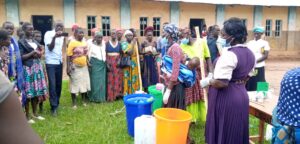
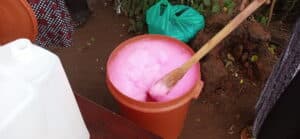
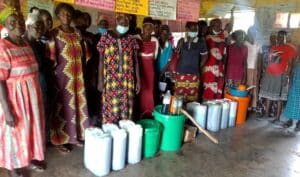
The advantages of the evolved SHG approach evidenced in soap production are further elucidated by another group activity in Otuke District: shea butter production. While the practice is widely employed in the district due to the ready availability of shea nut trees, the members of two SHGs noted that most people were approaching production in the “traditional way,” as individuals and amateurs. Adokorach explains that in the early summer of 2022 “the groups realized that beyond individual-level production, shea butter was a very viable enterprise… they wanted to be trained in shea butter production, value addition, and marketing skills.”
Allan Nyero, a Speed School Coordinator with Acholi Education Initiative, recognized similarly the potential for improving efforts by fostering group collaboration and providing skills training beyond just capital. “They were already making shea butter at household levels and taking it to the local market but not really looking at bigger market potential. Since we were already doing this… [we] needed only to equip them with better skills,” he says. Nyero organized a training with experts who specialize in working with shea butter. Prior to the training, members were grinding shea nut seeds with stones, packaging the butter in leftover plastic bottles, and storing the product in non-standard ways. Boniface Ejuka, a SHG member, shares, “The product was of low quality. We packed it in 500ml used mineral water bottles and sold it at a low price. Sometimes the bottles broke, and we made losses.”
The SHG members were trained in how to produce and market high-quality shea butter. They learned to sort for quality seeds and then grind them using a machine. They were then shown to remove the butter and pack it in an attractive manner in new factory-produced containers. Each container is labeled with a sticker displaying their unique brand name, which they purchased using their capital injection. Both the containers and stickers are sourced from Kampala, which is cheaper than local alternatives. Members were further taught how to explain and grow the market for their products. “This is a group that, if we support it really well, will be able to go on radio and talk about their products and continue to expand their market,” says Adokorach.
As in soap production, the SHG members contributed half of the cost of this training. “If they are supported without making them feel the weight of the expenditure, they will actually not take it seriously. If they invest their money as well, they will keep thinking they should not lose whatever they have started,” explains Nyero. The emphasis on individual ownership over income generation activities, even in the shift to group ventures, is a critical piece of the continued success of the strategy.
This success is further substantiated by promising sales. “The members reported success in the market because they have done value addition, created brand names, they have stickers on their packaging, and very clean, fine bottles. This had made their product unique and it’s attracting many buyers as a result,” explains Adokorach. Ruth Anyait Okello of the Otuke District describes the success, elaborating, “It is sold everyday unlike the food sale that happened once a week. More income is earned by the group. The group members work together to keep the products available for daily sales at a better price, and we are saving money. This way, I am sure of financial security.” The first group’s success attracted an additional five groups who have since been trained in shea butter production. Identifying the potential for even greater collaboration, several of the SHGs are thinking of joining together to form a larger association so that they can register with the community development office as an official business. This will allow them to participate in government capacity building trainings and expand their market even further. Nyero concludes, “Self-Help Groups are taking more ownership. They’re working together and striving to see positive progress all the time.”
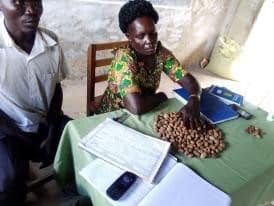
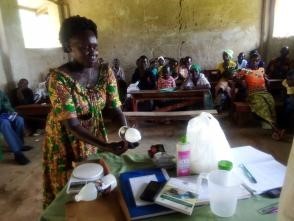
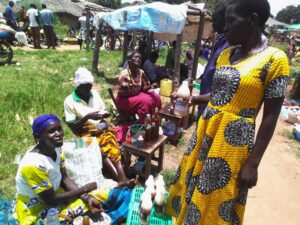
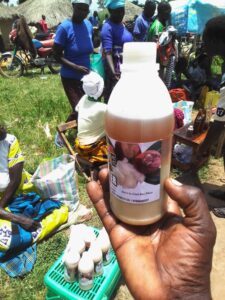
A third and most recent case reinforces the distinct advantages of the evolved SHG strategy. After encouraging the 2022 cohort of SHGs in Kitgum and Agago districts to decide on a skills training to join in a group IGA, one group in Agago District, named Kwanber, chose beekeeping. James Nyeko, a Speed School coordinator, explains that “This group was one of the best performing groups in terms of mobilizing resources to save. We chose them for that reason. Since they looked committed and solid, we thought, let’s pioneer this skill.”
After understanding Geneva Global’s request to share training costs, Kwanber proposed a budget outlining their own contribution. The members were trained over two days in both the logistics of beekeeping and its operation as a business. They were taught the types of bees, the types of beehives, pest control, and maintenance. The training also covered how to extract and purify honey for sale, including how to package and market the product. The trainer has provided continued support during harvesting. While some members were skeptical and fearful of embarking on a new endeavor, through the training “many realized making a beehive would not be a big deal. We would use local materials at low cost,” explains Nyeko.
Following the training, Kwanber devised an action plan. They sourced local materials and with their existing savings secured two hectares of land for the beehives. They then split into groups to begin making hives with the goal that each member has ten hives by the end of the year. Counting on the success of the endeavor and seeking to build lasting synergy, Nyeko has urged the group to use whatever profits come from the joint venture to pay the fees for all thirty of children enrolled in the Speed School students as a group once they enter formal schooling the following school year. The members are committed to this challenge. “This is where IGAs become the basis for learners engaging in school,” Nyeko asserts.
Since launching Speed School, Geneva Global’s approach has remained constant in equipping parents and guardians with the tools to attain financial security; however, newer strategies of prompting members to generate stronger ideas, work together, and apply their own savings towards their training have yielded promising results. In each case, SHG members found increased success and sustainability in their income generation activities by taking shared ownership over ventures as a group. Boniface Ejuka substantiates this point, saying, “We have pulled resources together, and it is more secure than a single household venture… I feel the future is more certain financially as we do work in group than as an individual.” Through group ventures which leverage diverse, demand-driven activities, SHG members can multiply their impact, operating more efficiently and mitigating many of the risks of individual IGAs.
The success of the group ventures has been matched by an equally groundbreaking transformation in the mindsets of the members themselves. By sharing the costs of training and materials and committing to grow and direct profits for the benefit of all learners, each member has a vested interest in the success of the group. Allan Nyero explains, “[If] you get the members to inject some of their own resources in it, then they won’t see it as a Geneva Global thing but as their own initiative with some support. If they really want to implement their idea, they will meet the cost… it’s a strong roadmap for sustainability.” By investing more time and energy into the ventures as a group, the members have also improved greatly their business-mindedness, realizing the importance of strategic investments in training and recognizing market growth opportunities.
The increased success and sustainability of the group ventures has improved dramatically the members’ ability to support their children’s education. Crucially, the commitment to group ventures contributes greatly to the promise of continuity with this financial support. James Nyeko explains, “the issue is that in individual IGAs, once the cycle is over, there is nothing that ties the members together. Once they have a group IGA, they remain together even after students have left Speed School. The Self-Help Group will remain operational.” This ensures that even when students enter the formal learning system, which requires increased fees for uniforms, learning materials and other necessities, parents will be able to confidently support their children through the transition.
“The moment the children are placed in the formal learning system, they can pay fees for the whole year while continuing in shea butter production,” says Alan Nyero. Boniface Ejuka agrees, “By next year’s start of education time, all our children would be enjoying learning because we shall be having enough to pay fees in the formal school.” Ruth Anyait Okello adds, “If we continue, I am sure of having all my children and those of other group members go to school without dropping out. As group members, we are all hopeful for success.”